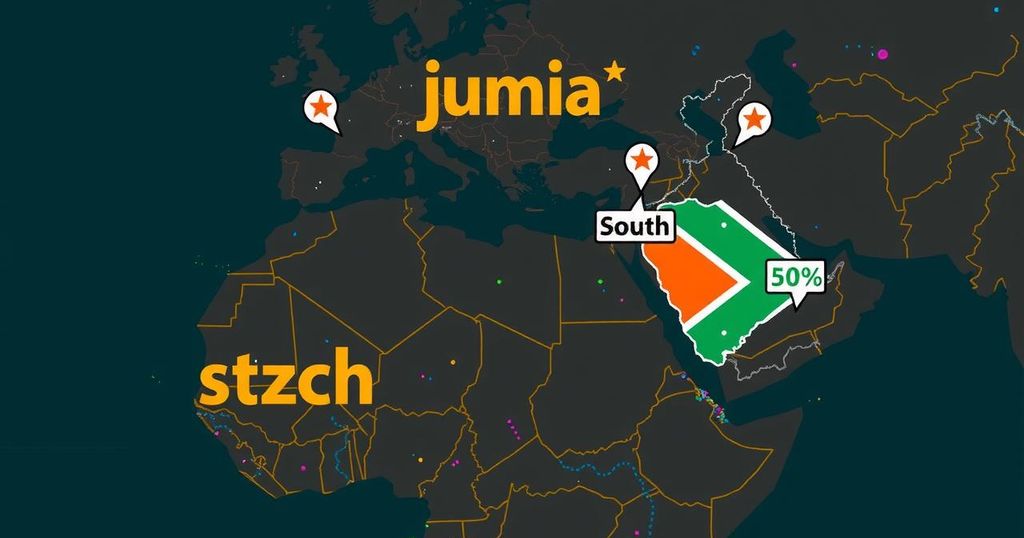Jumia has decided to stop its operations in Tunisia and close its clothing store Zando in South Africa by the end of the year as part of its cost-reduction strategy. This follows the previous discontinuation of its meal delivery service in seven African countries. Despite the challenges, Jumia seeks to recover losses through growth in more successful markets, having already cut 40% of its workforce under new CEO Francis Dufay.
Jumia, the prominent African e-commerce platform, has announced its decision to cease operations in Tunisia and eliminate its online clothing store, Zando, in South Africa by the year’s end. This strategic move is part of Jumia’s broader initiative to streamline its operations and enhance cost efficiency, as emphasized by a company spokesperson: “Money isn’t limitless, and we prefer to focus on other markets where growth prospects are strong.” Earlier this year, Jumia also discontinued its food delivery service, Jumia Food, in seven African nations including Tunisia, Algeria, Kenya, Uganda, Morocco, Nigeria, and Côte d’Ivoire, underscoring its commitment to cost reduction. Notably, the company previously retreated from the Cameroonian and Tanzanian markets in 2019, reflecting a pattern of scaling back amid financial pressures. From its headquarters in Abidjan, Jumia downplayed the consequences of its recent announcements, noting that Zando and operations in Tunisia collectively represented a mere 4.5% and 3% of the gross merchandise value in the first half of 2024, respectively. The company’s challenges in achieving profitability in both regions were cited as key factors in these decisions. In South Africa, the restructured business model under the leadership of CEO Francis Dufay has shifted its focus towards cosmetics and electronics, rendering Zando’s services misaligned with Jumia’s new strategic direction. Moreover, the entry of Amazon into the South African market last spring further solidified Jumia’s choice to terminate its operations there. The relatively small market size and economic hurdles in Tunisia have similarly hampered profitability efforts for the subsidiary. Despite these setbacks, CEO Dufay remains optimistic, claiming that Jumia can “easily recover” any losses by leveraging its more lucrative markets. The company recently announced plans to expand its warehousing locations in key cities, including Cairo, Lagos, Abidjan, and Casablanca, while also targeting secondary cities and rural areas for growth opportunities. Jumia maintains a presence in a number of other nations, including Algeria, Uganda, Senegal, Ghana, and Kenya. These developments coincide with Jumia’s significant workforce reduction of 40% since Dufay’s appointment in November 2022, as the company grapples with a 17% decline in revenue in the first half of 2024, totaling $36.5 million. In August, Jumia secured nearly $100 million through a share sale on Wall Street, and as of October 16, the company’s stock was priced at approximately $5.06.
The e-commerce landscape in Africa is experiencing significant upheaval, with companies like Jumia navigating challenges related to profitability and market viability. Founded in 2012, Jumia has become one of the largest e-commerce operators on the continent, yet it has encountered increasing competitive pressure, notably from global players such as Amazon. In light of these pressures, Jumia’s recent strategy involves rationalizing operations to concentrate on profitable regions, which has included cutting underperforming services and exit strategies in less fruitful markets. The broader context includes economic difficulties in many African nations and fluctuating consumer demand, which exacerbate the challenges Jumia faces.
In conclusion, Jumia’s recent decisions to halt operations in Tunisia and South Africa’s Zando reflect a necessary strategy to optimize its resources and concentrate on more promising markets. Despite facing substantial challenges, including workforce reductions and declining revenues, Jumia’s leadership is hopeful about recovering lost business through expansion in other dynamic regions within Africa. Ultimately, the company’s future success will hinge on its ability to adapt to the rapidly changing e-commerce landscape in Africa and efficiently respond to competitive pressures.
Original Source: www.theafricareport.com






